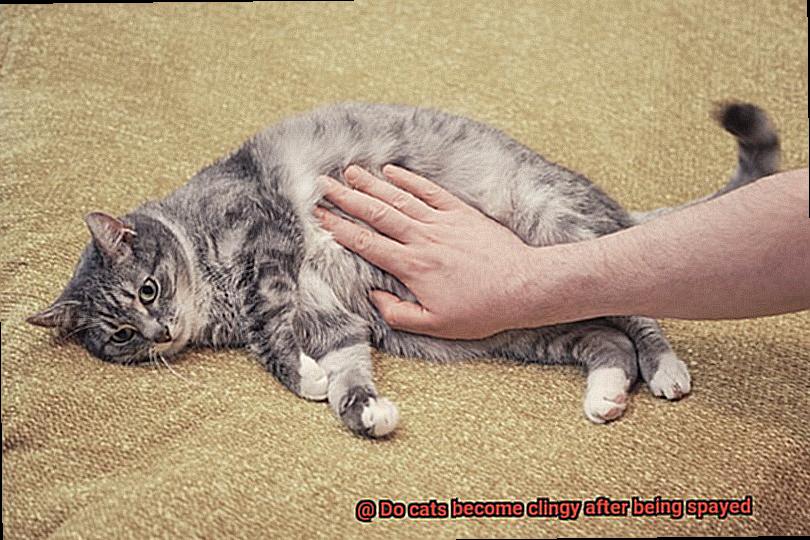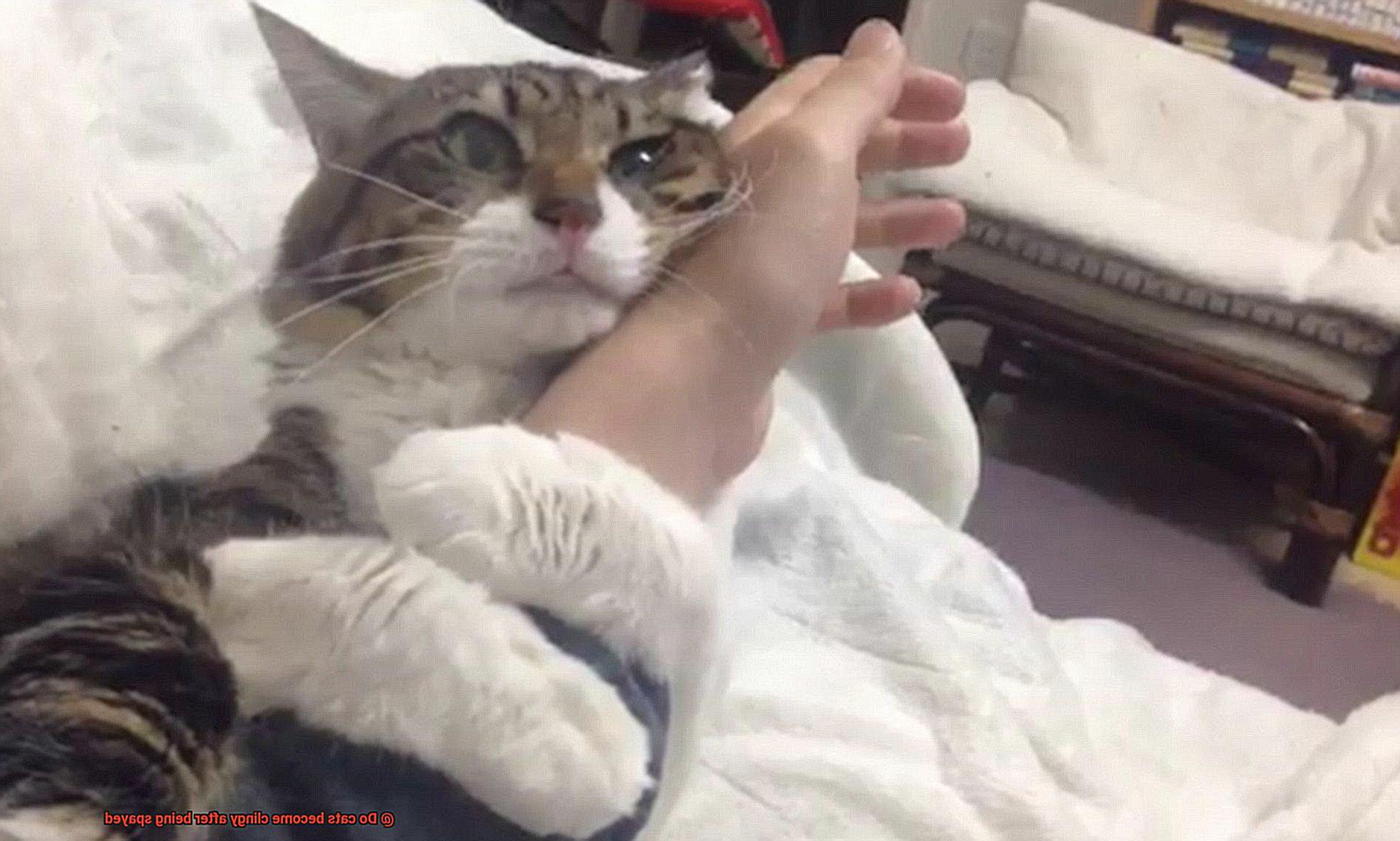As a cat owner, you may have heard rumors that your feline friend will become more attached and cuddly after being spayed. But is this really the case? The answer isn’t black and white. Some cats do show an increase in clinginess post-surgery, while others remain aloof as ever.
So what’s behind this change in behavior? One theory suggests that it’s due to hormonal fluctuations following the removal of the ovaries and uterus. With estrogen levels taking a nosedive, cats may feel more relaxed and laid-back, leading to greater affection towards their humans.

But does science back up this claim? And what do other cat owners have to say about their pets’ post-spay behavior? In this blog post, we’ll dive into the research and personal anecdotes to separate fact from fiction.
And if your furry friend has recently undergone spay surgery, don’t worry – we’ve got you covered. We’ll also provide tips on how to help your cat adjust to any changes in behavior or mood they might experience.
So whether you’re hoping for a snuggly lap cat or prefer your feline friend maintain their independent streak, keep reading. You never know what surprises await.
What is Spaying?
Spaying is a simple yet effective surgical procedure that can help your female cat live a healthier and happier life. By removing the ovaries and uterus, also known as an ovariohysterectomy, spaying can prevent unwanted pregnancies and reduce the risk of uterine infections and tumors.
Typically performed on cats between 4 to 6 months old, spaying involves administering anesthesia and making a small incision in the abdomen to remove the reproductive organs. Afterward, the incision is carefully closed with sutures or surgical staples, and the cat is closely monitored during the recovery period.
While spaying is generally considered safe and routine, as with any surgery, there are some risks involved such as bleeding, infection, and adverse reactions to anesthesia. It’s important to consult with your veterinarian before scheduling the procedure to discuss any potential risks or concerns.
After spaying, cats will no longer have heat cycles or be able to reproduce. They may also experience behavioral changes such as reduced aggression and territorial behavior. However, it’s worth noting that there is no evidence to suggest that spaying causes cats to become clingy. Other factors such as changes in routine or environment may be more likely to cause clinginess in cats.
During your cat’s recovery period, it’s essential to provide them with extra attention and affection. This can help them feel more secure and reassured. Additionally, providing your cat with plenty of mental stimulation through playtime or puzzle toys can help alleviate some of their anxiety and prevent them from becoming overly clingy.
How Does Spaying Affect a Cat’s Behavior?
Spaying is a common surgical procedure that involves removing your cat’s ovaries and uterus. While it’s primarily done to prevent unwanted pregnancies and reduce the risk of certain health issues, such as uterine infections and cancer, you may wonder if it will also affect your cat’s behavior.

One of the most significant behavior changes that occur after spaying is a reduction in the urge to mate. This means that your cat may become less vocal, restless, and affectionate towards humans. However, some cats may become more affectionate after being spayed. This could be because they no longer experience the stress and discomfort associated with being in heat.
Moreover, spaying can help reduce aggressive behaviors that may have been related to mating instincts. For instance, some female cats become territorial or aggressive towards other cats when they are in heat. Spaying can help eliminate these behaviors and create a more peaceful environment for your furry friend.
It’s important to note that every cat is unique, and their behavior after spaying may vary. Some cats may not experience any significant changes in behavior at all. Others may experience a temporary period of adjustment as their hormones settle down. In general, spaying is not likely to cause clinginess in cats.
During the recovery period after spaying, it’s essential to provide your cat with extra attention and mental stimulation to help them feel secure and prevent them from becoming overly clingy. It’s also vital to keep an eye on their behavior to ensure they are healthy and happy.
Signs of Increased Clinginess After Spaying
As an expert in feline behavior, I can explain why this happens.
One reason for increased clinginess is due to hormonal changes after surgery. Spaying involves removing the ovaries and uterus of a female cat, which can cause a decrease in estrogen levels. This hormonal shift may cause a cat to seek out more comfort and security from their owner.
Another possible reason is your cat’s discomfort or anxiety following surgery. Pain or discomfort may cause your feline friend to seek comfort from you. Additionally, unfamiliar surroundings and medical procedures associated with surgery may cause stress and anxiety, leading to clingy behavior.
It’s essential to remember that this behavior is usually temporary and should improve over time. However, if the behavior persists or becomes excessive, it may indicate an underlying issue that requires further attention from a veterinarian or animal behaviorist.
As a pet owner, it’s crucial to monitor your cat’s behavior after surgery and provide them with patience and comfort during their recovery period. Every cat is different, and some may experience temporary changes in behavior as their hormones settle down.
Why Do Cats Become Clingy After Being Spayed?
This behavior is completely normal and is rooted in the hormonal changes that occur after the surgery.
During the spaying process, a cat’s ovaries and uterus are removed, resulting in a decrease in hormone production. Hormones such as estrogen and progesterone not only play a role in regulating a cat’s reproductive cycle, but they also affect her behavior and temperament.
As a result of the surgery, a cat’s hormone levels drop drastically, leaving her feeling more anxious and stressed than usual. This can cause her to seek comfort and reassurance from her owner, leading to clingy behavior. Additionally, the pain and discomfort associated with the surgery can also contribute to this behavior.
It’s important to remember that not all cats will exhibit clingy behavior after being spayed. Each cat is unique and may react differently to the hormonal changes that occur. However, if your furry friend does become clingy, it’s crucial to offer her the attention and comfort she needs during this time of adjustment.
As your cat’s hormone levels gradually balance out, her clingy behavior should subside, and she will return to her independent self. In the meantime, be patient with her and give her plenty of love and affection. Remember that spaying your cat is an essential part of responsible pet ownership and provides numerous health benefits for your furry friend.
Coping with a Clingy Cat After Spaying
But after being spayed, some cats may become more clingy than usual. This is because spaying involves the removal of the ovaries, which can cause hormonal changes and affect a cat’s behavior. Some cats may seek more attention and affection from their owners, while others may become more anxious or needy.
If your cat has become clingy after being spayed, there are several things you can do to help them cope with this behavior. First and foremost, it is crucial to give your furry friend plenty of love and attention. Spend extra time playing with them and giving them cuddles to reassure them that they are still loved and secure.
Another effective way to help your cat deal with clinginess after spaying is by providing them with a designated space where they feel safe and comfortable. This could be a cozy bed or a specific area of your home where they can retreat when they need some alone time. Additionally, providing your cat with toys and other forms of stimulation can help distract them and alleviate any anxiety they may be experiencing.
It’s important to remember that clinginess after spaying is usually temporary and will likely subside within a few weeks or months. However, if the behavior persists or becomes problematic, it may be worthwhile to consult with your veterinarian for further advice and guidance.
When to Seek Veterinary Advice
Spaying your beloved feline friend is a responsible decision that can provide numerous benefits, including preventing unwanted litters and reducing the risk of certain health issues. However, it’s important to keep a close eye on your kitty’s behavior after the surgery. While some cats may not experience any significant changes, others may become unusually clingy.
If your cat becomes clingy after being spayed, it could be a sign of an underlying issue that requires veterinary attention. Several factors could be causing this behavior, including pain or discomfort from the surgery, separation anxiety from being away from their owner during the recovery period, or hormonal changes. However, if this behavior continues for an extended period of time, it’s crucial to seek veterinary advice.
Furthermore, there are other signs to watch for that may indicate a problem, such as loss of appetite, lethargy, vomiting, or diarrhea. These symptoms could be indicative of a post-surgery infection or other complications. If you notice any of these signs in your furry friend after being spayed, it’s essential to seek veterinary advice immediately.
It’s also worth noting that there are behavioral issues that may cause cats to become clingy after being spayed. Some cats may experience separation anxiety and become overly attached to their owners. In this case, your veterinarian may recommend behavioral therapy or medication to help ease their anxiety.
GW5xWb5-6Kc” >
Also Read: Are Cat Clingy After Giving Birth?
Conclusion
In conclusion, the answer to whether cats become clingy after being spayed is not a clear-cut one. While some felines may show increased affection towards their owners after surgery, others may remain aloof. The removal of the ovaries and uterus can cause hormonal fluctuations that lead to changes in behavior, but there is no conclusive evidence to support this theory.
Regardless of your cat’s post-surgery behavior, it’s vital to provide them with extra attention and love during their recovery period. This can help alleviate any discomfort or anxiety they may be feeling and make them feel more secure. Engaging them with playtime or puzzle toys can also prevent excessive clinginess.
If your cat becomes overly clingy after being spayed, be patient and comforting during their adjustment period. Providing a designated space where they feel safe and comfortable, along with plenty of toys and stimulation, can distract them from their anxiety.
However, if your cat’s clinginess persists or becomes problematic, it may be necessary to seek veterinary advice. Pain or discomfort from the surgery, separation anxiety from being away from their owner during recovery, or hormonal changes could all contribute to this behavior. In such cases, consulting with your veterinarian for guidance on how best to help your furry friend adjust is crucial.
Remember that every cat is unique and will respond differently post-surgery.







